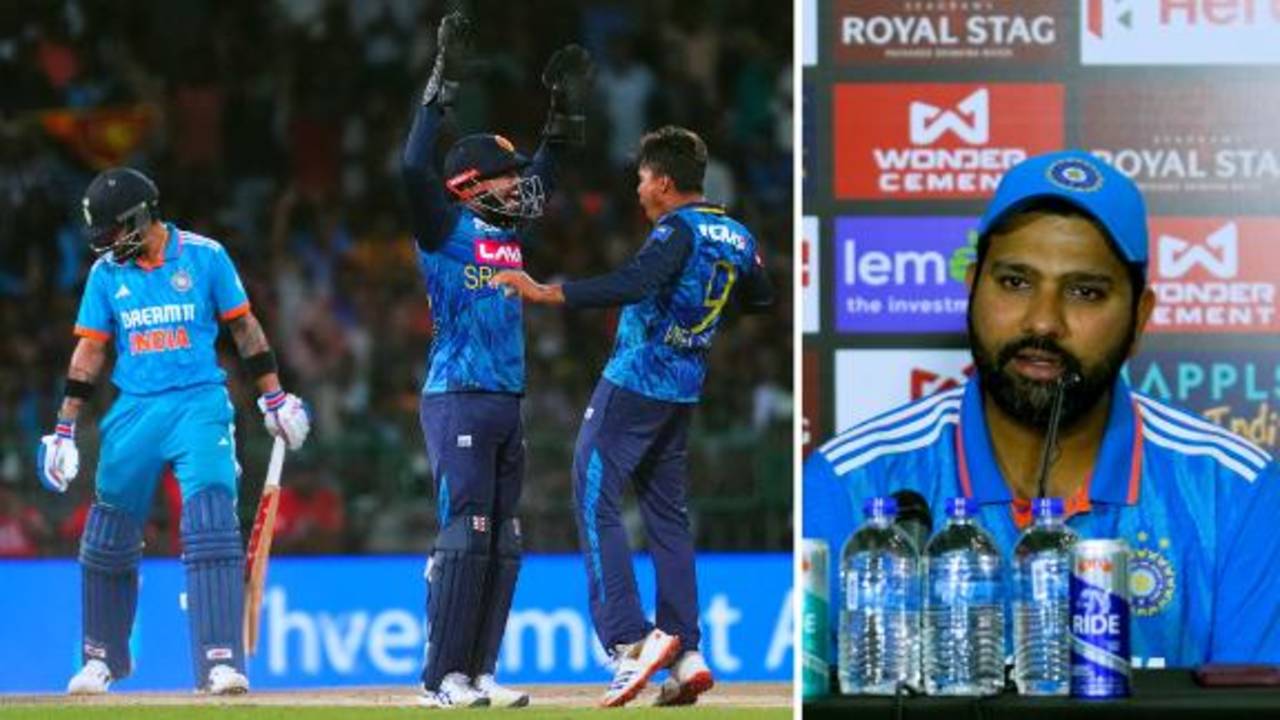India make progress in finding allrounders but still face plenty of questions
There were some positives, but the form of their pacers and their batting against spin have left India with plenty to ponder
Shashank Kishore
08-Aug-2024
India's run to the Champions Trophy in February has begun on a bumpy note. With just three more ODIs left, at home against England in January, Gautam Gambhir & co have their task cut out. Here's what India can take away from their ODI series loss to Sri Lanka:
Washington, Parag show bowling spark
The sample size is small, but there are signs India are veering towards multi-skilled cricketers. In all three ODIs, India's top six had at least one bowling option. They also lengthened their batting to play at least eight batters.
Among them, Washington Sundar perhaps made the biggest gain, picking up five wickets in 27 overs across three games at an economy rate of 3.88. With the bat, his defiance against Sri Lanka's spinners to revive their flagging hopes in the second ODI was impressive. In the third ODI, he counter-attacked to make a 25-ball 30 after the middle order was sent on a tailspin. That Washington was able to build on the gains he made from the T20Is in Sri Lanka and Zimbabwe, where he was Player of the Series, will greatly encourage the team management.
Riyan Parag is another middle-order batter who proved he can be more than a handful with the ball. With the ability to bowl both offbreaks and legbreaks, Parag delivered nine overs on ODI debut, returning with 3 for 54. His lone intent-laden knock against the turning ball yielded 15 runs. Parag also impressed with the ball in the T20I series, the slow pace and liberal flight of his deliveries harking back to the good old days.
Shivam Dube, however, missed out on a chance to make an impact in Hardik Pandya's absence. In the first ODI, he had the opportunity to see off the game. In the second and third, he was out cheaply to Jeffrey Vandersay's ripping legbreaks.
Arshdeep, Siraj go off the boil
If the team management was looking for fast-bowling options to back up the rested Jasprit Bumrah and the recuperating Mohammed Shami, they would've left Sri Lanka a bit disappointed.
On surfaces where 240 was above par, with the ball gripping and turning, India's seamers struggled for rhythm and consistency. In the decider, they went in with one specialist fast bowler in Mohammed Siraj, with Dube sharing the new ball. With no swing on offer, Siraj lacked his usual bite and was carted for 78 in nine overs in the third ODI. Arshdeep Singh's nine wicketless overs in the second ODI cost 58 runs. Harshit Rana and Khaleel Ahmed didn't get a look-in.
No clear winner in Rahul vs Pant
This was to be one of the key decisions facing the Indian team management in ODI cricket. KL Rahul started the series, but found himself out of the final ODI after scores of 31 and 0. Rishabh Pant, who replaced him to play his first ODI since a career-threatening car accident in December 2022, managed just 6 while also having an off day with the gloves.

Virat Kohli was out to spin in all three ODIs•AFP/Getty Images
India's spin struggle
Virat Kohli was out lbw to spin all three times. On each occasion, he reviewed but DRS would only confirm the obvious. Rahul too struggled, bowled for a two-ball duck, attempting to drive after being done in by the drift by Vandersay in the second ODI. Shreyas Iyer, like Kohli, was out playing down the wrong line. In the third ODI, Axar Patel shaped to cut, only to realise he had erred in judgment, as the ball spun back in to crash into the stumps.
Barring the odd occasion, like in the second ODI when Shubman Gill was out driving to a magnificent catch in the slips, or on Wednesday when Rohit top-edged a slog, India's batters were largely out defending. In Parag's case, he offered no shot and was bowled by a delivery that skidded through and didn't turn like he had anticipated. India lost 27 wickets to spin overall, the most a team has lost against this variety in a bilateral series. Rohit felt the team's application and shot selection could've been better.
Among those who missed out is Iyer. After beginning with a run-a-ball 23, he was out twice to sharp turn. With India slated to play 10 Tests and three T20Is over the next few months, Iyer is now looking at a six-month hiatus from international cricket, unless he breaks back into the squad in those formats. It's likely domestic form for Mumbai could dictate his standing in the scheme of things, when India play ODIs next in January.
Shashank Kishore is a senior sub-editor at ESPNcricinfo
